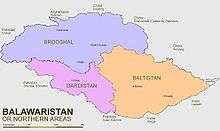Balawaristan
Balawaristan (Urdu:بلاورستان) is the historical name of Gilgit-Baltistan that has regained some prevalence in recent years through political movements in Pakistan. The archaic English spelling for the name was Boloristan or Baloristan, and its first known documented usage is in Chinese sources from the 8th century AD.[1] Balawaristan includes Chitral, Gilgit, Skardu, Hunza, Nagar, Ishkoman, Punial and Yasin (see Districts of Gilgit-Baltistan). In addition, the regions of Baltistan, Ladakh (including Kargil) are also considered to be a part of Balawaristan by the nationalist parties of Gilgit.[2]
Origins of the name
The name is originated from Polore. Polore was an ancient state consisting of Baltistan, Gilgit, Ladakh, Chitral and Kohistan. Chinese historian Faxian mentioned it as Pololo. Arab historians mentioned it as Blore. The people of this region have historically been referred to as Balawars (or highlanders), which is said to have come from the term Bala, which means high, a reference to the high-altitudes prevalent in this area. An alternative theory links the name to a mythic ancient king called Bolor Shah,[3] who had first united the region and from whom local rulers in turn often claimed descent.[4] Yet a third theory was proposed by the National Institute of Historical and Cultural Research of Pakistan that "the name is most probably derived from the title Patola, the Buddhist royal dynasty which was powerful in the region from to 8th centuries AD."[5]
Historically, the Baltistan region was called "Great Bolor" and Dardistan and parts of Brooshal (e.g. Gilgit Valley) were called "Little Bolor." Great Boloristan is known to have sent ambassadors to the Chinese court.[6]
Political status movements
In more recent times, the name Balawaristan is found used by minor political party like Balawaristan National Front led by Nawaz Khan Naji. The party is seeking to declare Gilgit-Baltistan a province of Pakistan. It also wants to give the people of Gilgit Baltistan representation in the Pakistani National Assembly and Senate, and to extend the jurisdiction of the Supreme Court to the region.[7]

Some Balawar groups, such as the Gilgit-Baltistan United Movement, have limited their demands to total autonomy and a respect for their distinctiveness.
The Balawaristan National Students Organisation, in April 2008, raised a demand for Balawaristan to be constituted into the fifth province of Pakistan (the other four are Punjab, Sindh, Balochistan and Khyber Pakhtunkhwa).[8]
However, Balawaristan National Front-Hameed Group (BNF-H) led by Abdul Hamid Khan had demanded independence of Balwaristan region from Pakistan. BNF-H led by Abdul Hamid Khan was the only group in Pakistan who was seeking independence of Balawaristan region. However, Abdul Hamid Khan had unconditionally surrender to Pakistan security officials on 8 February 2019.[9][10] Since Abdul Hamid Khan surrender, no group or individual has asked for independence of Balwaristan region. The fate of Balawaristan National Front (Hameed group) is also unknown.
See also
References
- Osterreichishe Leo-Gesellschaft, Görres-Gesellschaft, Anthropos Institute, Görres-Gesellschaft zur Pflege der Wissenschaften im Katholischen Deutschland, Bonn, Leo-Gesellschaft, Vienna (1984), Anthropos, v.79 no.1-6, retrieved 2009-01-24,
A more indigenous label for the same territory is Bolor (or Boloristan); this designation had appeared in Chinese sources already in the 8th century.
CS1 maint: uses authors parameter (link) - Behera, Demystifying Kashmir 2007, p. 205.
- "The Palola Shahi Dynasty (6–8th C. AD)". balkhandshambhala.blogspot.it.
- Amanullah Khan (1999), Gilgit Baltistan, a Disputed Territory Or a Fossil of Intrigues?, retrieved 2009-01-24,
... Princes of Gilgit-Baltistan assumed to be descendants of Bolor Shah ...
- National Institute of Historical and Cultural Research (Pakistan) (1988), Pakistan Journal of History and Culture, v.9, retrieved 2009-01-24,
As the name Bolor suggests, Gilgit has been the most ancient kingdom in the area. The name is most probably derived from the title Patola, the Buddhist royal dynasty which was powerful in the region from to 8th centuries AD.
CS1 maint: uses authors parameter (link) - Centre for the Study of the Civilizations of Central Asia (Pakistan) (1979), Journal of Central Asia, v.2 no.1, Centre for the Study of the Civilizations of Central Asia, Quaid-i-Azam University, retrieved 2009-01-29,
The eastern half, Great Bolor, could afford to send several embassies to the Chinese court during the first half of the 8th century
CS1 maint: uses authors parameter (link) - Ali, Manzoor. "Gilgit-Baltistan shocker: Nationalist candidate wins Ghizer by-poll – The Express Tribune". Tribune.com.pk. Retrieved 2012-05-31.
Naji said that the federal government should declare Gilgit-Baltistan a province of Pakistan, give its people representation in the National Assembly and Senate, and extend the jurisdiction of the Supreme Court to the region
- "Provincial status sought for Gilgit, Baltistan", Daily Dawn, 2008-04-01, retrieved 2009-01-24,
Historically, geographically and politically, Gilgit-Baltistan deserves to be a province. The people of the region should have the right to send their representatives to the National Assembly and Senate of Pakistan, of which they have been deprived for the last 60 years, said speakers at a seminar organised by the Balawaristan National Students Organisation here.
- "RAW network busted in GB". The Nation. 21 May 2019. Archived from the original on 21 May 2019.
- "Pakistan security forces say they busted subversive network in Gilgit". Times of India. 21 May 2019.
Bibliography
- Behera, Navnita Chadha (2007), Demystifying Kashmir, Pearson Education India, ISBN 8131708462